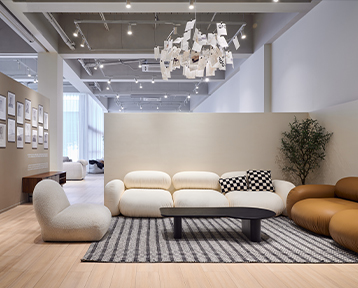Before purchasing furniture, big data constantly pushes interior design ideas—rooms where every corner resembles your dream home. That overwhelming sense of ease and relaxation is incredibly appealing.


But when the furniture arrives at your home, unexpected problems always seem to arise. You may have chosen the same couch as KOL, carefully considered the layout, yet the living room still feels unsatisfying, somehow disconnected from your actual life.

The sofa is the centrepiece of the living room, and the sofa also sets the tone for the entire interior decor. It offers space for relaxation and socialising—it is our most constant companion in everyday life. Quite simply, the sofa that can withstand everyday life and at the same time beautify the home.
Choosing a right sofa is more or less like finding a home, the search can be long and tedious—after reading countless buying guides and saving dozens of recommendations, we still often feel overwhelmed when faced with so many options. In fact, many of the sofas on the market that appear so different are really just variations of a few classic types of couches. It’s the subtle differences in detail that make them seem so diverse.
So…
What Types of Couches Would You Need to Buy?
First and foremost, it’s not just about choosing the most beautiful fabric — what truly matters is understanding what type of sofa best suits our living room.
Types of Couches
So in this article, we’ll take a closer look at the different types of couches and what makes each one unique.
Types of Couches – Modular Sofa
The modular sofa was first invented by American furniture designer Harvey Probber in the 1940s (though some argue that similar designs appeared as early as the 19th century). Today, as people seek more compact and stylish solutions, modular sofas have made a strong comeback in modern homes and large spaces alike.

Cubo sofa by Harvey Probber
A modular sofa is made up of individual units, allowing it to adapt to any room styles layout. You can shape your couch however you like—regardless of size or configuration, whatever the shape, materials or size, giving you full control over your space.

The flexible modules can be rearranged to change the shape of the couch entirely, or even redefine the layout of an entire room.

Remove a unit for everyday simplicity.

Add one! Turn it into a sofa bed or incorporate a ottoman for extra lounging comfort.

One of the most exciting aspects of this type of couch is the ability to mix and match different shapes, fabrics, and colors. Love the texture of leather but also enjoy the comfort of fabric? No problem—combine them.

And there’s no need to worry about mismatched chaos. You can follow grado’s recommended combinations or consult a professional designer or space planner to create the perfect configuration for your home or project.
Types of Couches – L-Shape Sofa
The L-shape sofa likes capital letter “L”, features two seating sections arranged at a 90-degree angle.

The extended section offers a lounging function, combining the comfort of a traditional sofa with the relaxing benefits of a chaise lounge. Compared with other same volume it also provides more seating space, making it one of the most popular and space-efficient types of couches on the furniture market.

And for the space matching of the L shape sofa that pairs easily with lounge chairs. L shape sofa can help naturally divide the space. Without the need for walls or partitions, it effectively separates different leisure area and entertaiment area, creating a layout that is both open and well-organized.
That’s why the L shape sofa is a foolproof choice—ideal for those who don’t want to overthink their interior design.
Curved Sofa
In the 1950s, Vladimir Kagan designed the Serpentine sofa for an art collector. The curved design allowed people to better view the art pieces on display, and this sofa has also inspired many furniture designers.

A circa-1950 interior by Kagan-Dreyfuss in Forest Hills, New York. Among the furnishings are an early Serpentine sofa, a Kagan glass-top cocktail table, and a Kagan tripod side table.
Photo: Vladimir Kagan Design Group
The smooth lines and the rounded shape of a curved sofa, bringing a sense of vitality and fluidity to the space.

Curved sofa is a great choice for open-plan living. It prevents a spacious living room from feeling cold or empty. Instead, it naturally defines cozy zones for conversation and relaxation. Guests are drawn in more easily, encouraging closer interactions and creating a room atmosphere that feels both warm and flowing—ideal for hosting and socializing.

When most furniture pieces in a space are square or rectangular, the sharp corners can make the environment feel stiff and cold. Compared to trditional sofa, curved sofas feel more inviting and warm. Unlike L-shaped sofas, curved models typically require more space, but with thoughtful planning of the space behind the sofa, the back view can become a stylish design element in itself. It can even serve as a beautiful room divider.

Among the many types of couches, the curved sofa stands out for its sculptural elegance and ability to soften the overall spatial impression.
Types of Couches – Face to Face Couches
If a straight sofa is placed alone in the living room, it is easy to feel empty and underwhelming. Need more matching but this will enhance the difficulty of matching.
Face to face couches, on the other hand, involve positioning two straight sofas directly opposite each other, creating a layout that feels symmetrical and balanced. This arrangement not only breaks the dullness of a single setup but also brings a sense of classic or transitional style to the space.

If your living room is often a place of communication, you don’t want a TV or fireplace to dominate the room as a focal point, this is a very effective design approach. It encourages face-to-face interaction.

When you gathering needs more seating, lounge chairs can be added to the sides to easily form a U-shaped modular layout.

Among the different types of couches, straight sofas offer great flexibility and a wide range of choices in terms of style, upholstery, and color. For lovers of bold, maximalist interiors, this layout becomes a playground for personalization and creative combinations.

That said, some may hesitate to use a double straight-line layout, especially if they prefer a light and flowing atmosphere in the living room. The clean, parallel lines of two sofas can feel a bit rigid. But this concern is easily resolved—leaving negative space on both sides or adding small decorative objects can soften the overall feel and bring the room back into balance.
Types of Couches – Without Sofa
In recent years, the idea of a without sofa in living room has gained popularity.Especially for many young people, the living room is no longer just a place for entertaining guests—it has evolved into a space for self-healing.

While sofa is the centrepiece of the living room, it is not an absolute necessity.
If your living room is primarily a personal retreat rather than a social hub, and you don’t have enough space for a sofa and other furniture combinationsyou, so you may not need a traditional sofa at all. Instead, consider alternatives such as floor sofa, daybeds, recliner, or cozy armchairs. These options offer both physical comfort and emotional ease, while allowing the space to remain open, flexible, and uniquely yours.

This approach to furniture transforms the home into a true private sanctuary.
Lightweight pieces can be rearranged freely, enabling dynamic layouts and refreshing changes. A sofa-free living room breaks away from traditional constraints and adds unexpected visual interest.

Your home is your lifestyle.
Choosing a sofa isn’t just about filling a space with furniture, it’s about defining how you want to live. Behind every decision—whether it’s size, style, shape or material—is a deeper exploration of your personal lifestyle.
Explore grado to discover not only the right types of couches, but also lounge chairs and flexible seating that support the way you live.









